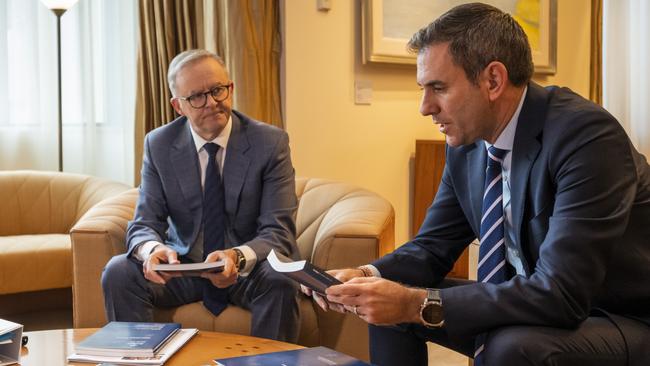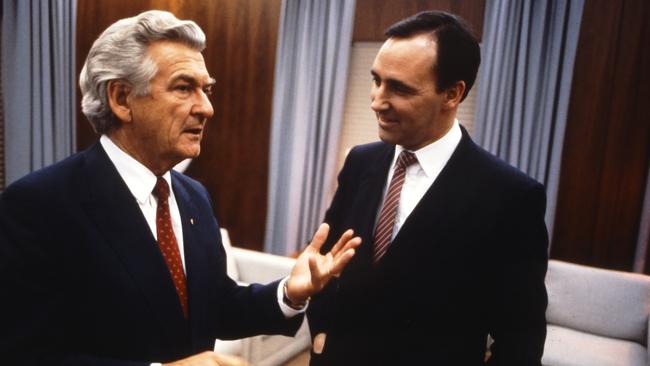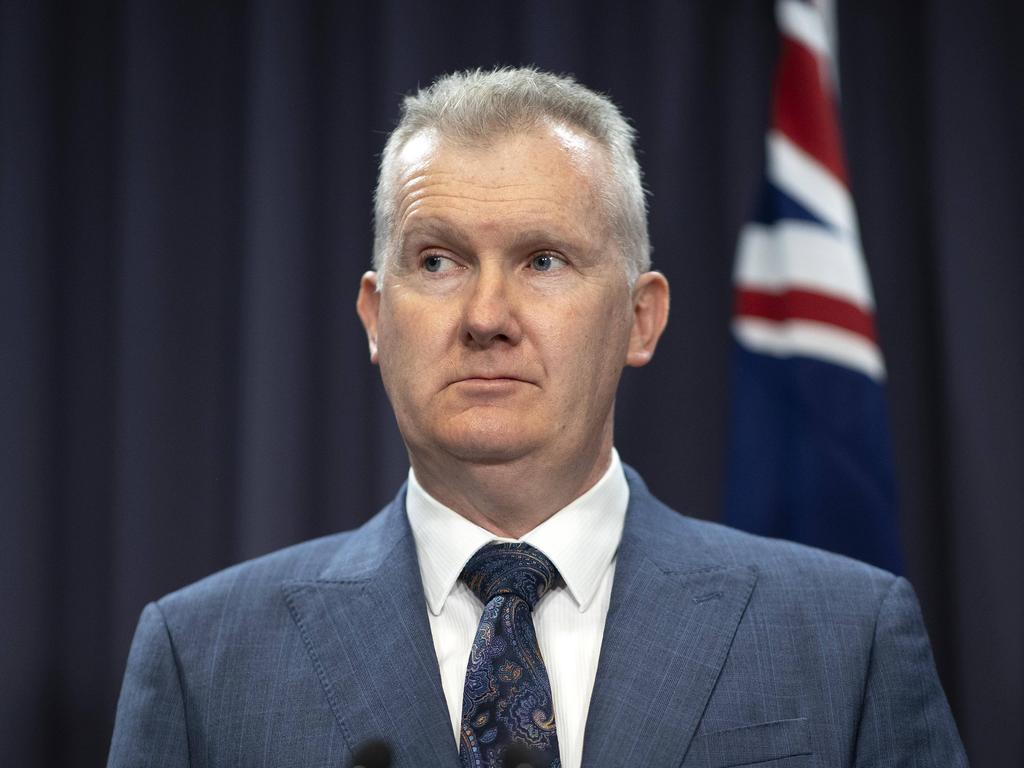
But Albanese, a former deputy PM to Rudd – a big-spending centralist – now risks being judged anything but a reformer in the Hawke-Keating mould.
Industrial Relations Minister Tony Burke has introduced a 249-page “Secure Jobs, Better Pay” Bill that could return the IR system to the sort of industry-wide bargaining that prevailed before Labor’s accord with the trade union movement in the 1980s, and dilute the subsequent Keating enterprise bargaining legislation of 1993.
Hawke and Keating had the support of a forward-thinking ACTU secretary, Bill Kelty, who understood the secret to better wages and conditions was improved productivity.
Present ACTU secretary Sally McManus is no Kelty, but she seems to be succeeding at bending political Labor to industrial labour’s will.

For her, this is existential. Hawke came to power with union membership at 50 per cent of the workforce. Membership today sits at 14 per cent, most in government jobs.
Burke argues his proposed legislation winds back the failed industrial reforms of former PM Julia Gillard’s Fair Work Act and its Better Off Overall Test, which was so onerous it could undermine any enterprise reform if it could be proven even a single worker was disadvantaged, even if the workforce supported it.
Politically, the government believes voters will see rising wages as an unambiguous good.
Burke is a strong supporter of industry-wide industrial bargaining. In the lead-up to the jobs summit in early September, he told ABC’s 7.30 he was very interested in a proposal by the ACTU to allow multi-employer bargaining as a way to secure improved pay across low-paid sectors of the workforce.
The Australian Financial Review was correct when it editorialised on October 27: “Labor’s … Bill risks injecting new technicalities … into the bargaining system, while also seeking to ram through a seismic shift … by bringing back one-size-fits-all pattern bargaining.”
The Hawke-Keating governments and Kelty’s ACTU worked hard to garner the support of the media for what was in essence a winding-back of union power. At this newspaper the late Les Hollings as editor-in-chief and at the AFR the late Paddy McGuinness led the media campaign for improved labour market flexibility and productivity that set up the nation for 30 years of prosperity.
Today, journalists are much less interested in prosperity linked to productivity improvements. Most journalists really could not explain the link and are content to parrot Labor lines about the need to get wages growing, even though the evidence is that wages have in fact been growing, albeit – as in the rest of the developed world – more slowly than in previous times.
Things are a little more pressing this year because of a global spike in inflation, but the answer for national prosperity is definitely not a 1970s-style wage-push inflationary spiral.
Slower wages growth since the Global Financial Crisis in 2008 is partly down to the effects of technology – particularly efficiencies driven by e-commerce – and partly to the rise of China and India as manufacturing superpowers. In the West, high-paying jobs have centred on the finance and knowledge industries; manufacturing has hollowed out and employment growth has been in the low-paid services sector.

Another central Albanese policy will only accelerate this trend. The government’s 82 per cent renewables by 2030 agenda will speed the decline of manufacturing as power-dependent heavy industries move to countries with reliable energy supplies, such as China where the building of coal-fired power plants continues.
The Financial Times reported on November 2 that giant German chemical manufacturer BASF “planned to downsize permanently in Europe as it opened a new plant in China”. Shell is moving its manufacturing base to the US where fracking has cut gas prices. Mercedes has decided to make its EVs in the US.
Reuters on November 2 reported European energy intensive industries such as aluminium, fertilisers and chemicals were “at risk of companies permanently shifting production to locations where cheap energy abounds, such as the US”.
It’s a dangerous background for a government pushing higher wages. Phil Coorey in the AFR on October 27 nailed it: “What is clear is that there is a generational gap in industrial relations, in that no one in the union movement (and few in politics and journalism) has any lived experience or memory of the 1970s. Anyone who questions the potential economic downside … (of) removing the link between productivity and wages can simply be accused of opposing wage growth for the low paid.”
The politics of Labor’s attempts to pass its Bill are fascinating. The Teals are urging caution, want more time to review the legislation and have for the first time put some policy distance between themselves and Labor and the Greens. And no wonder. Business owners and corporate executives in rich Teal seats will not swallow Labor’s self-serving lines about lifting wages, especially after its neutering of the Australian Building and Construction Commission.
The ABCC’s role in policing industrial action under the Fair Work Act will be transferred to the Fair Work Ombudsman from Thursday. In last month’s budget, Labor scrapped funding of the ABCC and gave the Fair Work Ombudsman an extra $70m over four years to police building sites. If the government cannot get its abolition through the Senate, the ABCC will simply be defunded.

Labor spent much of its last term in opposition constructing a false narrative of job insecurity and increasing casualisation of the workforce that is now being used to cajole business into supporting the IR changes. The facts are different. Unemployment is at a 50-year low of 3.5 per cent and a Productivity Commission report has belled the cat on the idea the gig economy makes employment less secure.
For Albanese this is not the ideological issue some imagine. Unlike many from NSW Labor, he was not a creature of the NSW Labor Council and spent much of his political youth fighting Sussex St. Why would he risk his electoral standing on a poorly thought-out raft of IR reforms that will do nothing to make the country stronger in perilous economic times?
This column has not been a fan of the independent member for Warringah, Zali Steggall, but she was correct when she said last week that Burke’s Bill was an attempt to unionise non-union sectors of the workforce.
Ewin Hannan in The Australian on Friday reported Labor was considering a possible compromise to win over support from independent senator David Pocock. Businesses would be allowed to negotiate with workers directly for six to 12 months before being roped into multi-employer bargains by unions. It’s still a step backwards for the party that pioneered labour market deregulation.
Albanese needs to reflect on whether this Bill is really worth the risk as inflation and interest rates soar globally, along with domestic power prices. He will own the consequences.






Just as Kevin Rudd before the 2007 election promised to be a John Howard-light economic conservative, Prime Minister Anthony Albanese and Treasurer Jim Chalmers have claimed they will emulate reforming former Labor leaders Bob Hawke and Paul Keating.